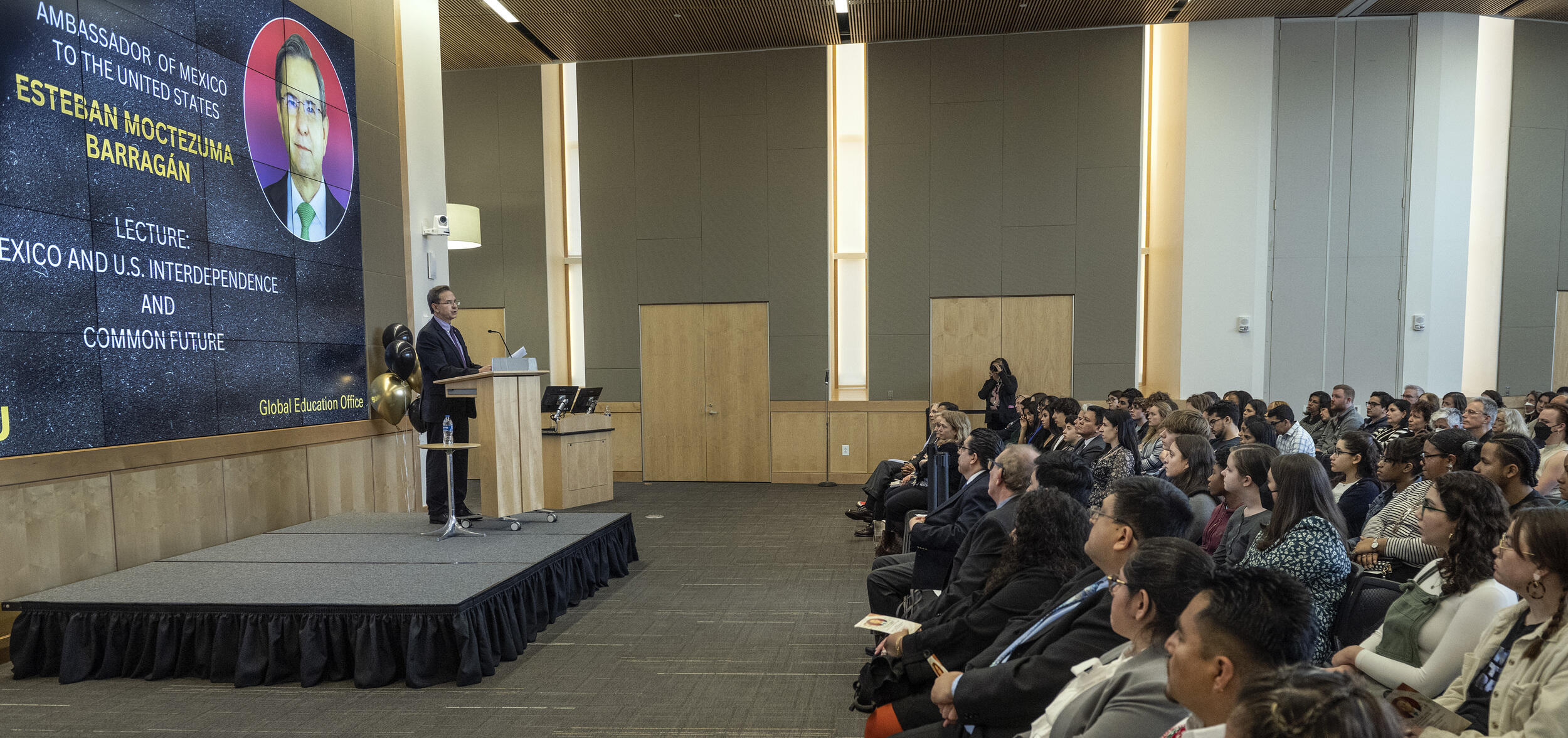
Jan. 30, 2024
During visit to VCU, Mexico’s U.S. ambassador stresses the ties that bind
Share this story
The U.S. and Mexico have grown up next to each other in recent centuries, but trade and integration – more than just proximity – have brought the two nations together, Mexico’s U.S. ambassador said.
Esteban Moctezuma Barragán, who was appointed to the top diplomacy role 2021, addressed an audience Jan. 25 at Virginia Commonwealth University’s James Branch Cabell Library. His lecture, “Mexico and U.S. Interdependence and Common Future,” was hosted by VCU’s Global Education Office and highlighted the strong ties between the nations, including how they can foster a more prosperous future.
Moctezuma emphasized how the North American Free Trade Agreement, which took effect in 1994, laid the foundations for one of the most important economic blocs in the world. About $1.5 million is traded between the U.S. and Mexico per minute, and Mexico buys more American goods than the entire eurozone.
“Our proximity allowed us to create an integrated North American supply chain,” Moctezuma said. “This means that our economies don’t compete against each other. They complement each other.”
He cited avocados as an example of industries growing together across the border. California farmers initially were worried that avocados from Mexico would steal their market, but demand grew so much that farmers from both nations sold out their produce.
“So when the curve is gathered together to produce, the markets grow, the demand grows, and everybody grows,” Moctezuma said. “It’s not that we just exchange – we are producing together.”
As for two hot-button issues – migration and security – that continue to impact U.S.-Mexico relations, the ambassador stressed the need for creative solutions.
While many migrants move through Mexico, Moctezuma noted that his country has become a destination itself. Mexico has the third-highest number of refugee applications submitted worldwide, and he added that economic development in Mexico has prompted many immigrants to not enter the U.S.
“And that’s why we think that the root of migration is development, and that we need to expand the development opportunities to poor countries in order to give all the people the chance to make a decent living in their own places,” Moctezuma said.
He also highlighted how border crossings unite the two countries economically. People cross into the U.S. and Mexico constantly to do business, creating a flow of nearly $2 billion daily.

Regarding security and drug trade, Moctezuma said Mexico is actively addressing the issues. In the past four years, Mexican authorities have seized 1,400 pounds of fentanyl and destroyed 1,379 labs. He said the rise of fentanyl use in the U.S. can be linked to the overprescription of opioids that got people addicted, and while law enforcement remains a necessary tool to combat the drug problem, it should be viewed as one piece of the puzzle, not the entire solution. Addressing demand as well as supply is key.
“Our collective responsibility is to move beyond the blame game and work together to protect our countries,” the ambassador said.
Moctezuma, who previously served as Mexico’s secretary of public education, also said he had spoken with VCU representatives earlier in the day about academic collaboration. He noted that while there are 360,000 students from China studying in the U.S., there are only 14,000 from Mexico.
“Part of our conversation today was to increase that exchange here in the university,” Moctezuma said, so that new generations can build on the values and opportunities that link the U.S. and Mexico.
Jason Tejeda Molina, a senior majoring in mass communications in broadcast and minoring in theater, is a research assistant in VCU’s History Department and is helping create a database of Latin Americans in Virginia and their experiences. He said attending Moctezuma’s address was a rare opportunity to hear directly from a prominent Latin American diplomat – a sentiment that was shared by future college students, too.
In addition to members of the VCU community, Richmond-area students from J.R. Tucker High School, Maggie L. Walker Governor’s School and St. Christopher’s School, as well as students from Stuart-Hobson Middle School in Washington D.C., attended the lecture.
Daniella Gauna Gabriel, a student from J.R. Tucker, said her father’s side of the family is from Mexico, so she wanted insight into the country’s perspective. What she took away from Moctezuma’s address was “in darkness, there’s light.”
“Although America and Mexico have a lot of issues, there are a lot of things that are positive and they’re trying to work together,” Gauna said.
Jill Blondin, Ph.D., associate vice provost for global initiatives at Virginia Commonwealth University, helped bring the ambassador to VCU and the lecture was put on by VCU’s Global Education Office.
“Ambassador Moctezuma's visit was incredibly impactful. Nearly 300 people from the VCU and the Richmond community, including a large number of high school students, attended the lecture,” she said. “The ambassador shared a nuanced and thoughtful message about Mexico-U.S. relations, which emphasized mutual understanding and empathy; it was obvious that his words really resonated with the audience. Additionally, he met with VCU administrators, faculty, and students to discuss ways that we can work together for everyone's benefit.”
Subscribe to VCU News
Subscribe to VCU News at newsletter.vcu.edu and receive a selection of stories, videos, photos, news clips and event listings in your inbox.







